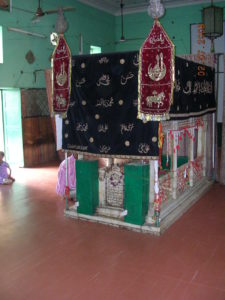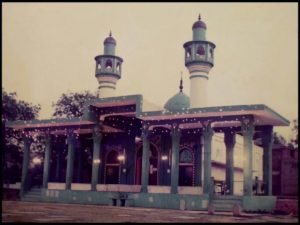QAZI NURULLAH SHUSTARI
(Shaheed-e-Salis)
Qazi Sayyid Nurullah al-Husaini al-Marashi al-Shustari, known in India as the Shaheed-e-Salis (the third Martyr) was the greatest Shia scholar in India. His ancestors came from Amul the capital of Tabaristan, or Mazandaran as it was known under the Abbasids.

Sayyid Nurullah was born in 956 A.H./1549 C.E. and was educated by his father in the traditional and rational science. He studied medicine under Hakim Maulana Imaduddin. Mir Saifuddin Mohammed and Mir Jalaluddin Mohammed Sadr of Shustar too were his teachers. In Rabi-us-Saani 979/August-September 1571 he left Shustar for Mashhad on a pilgrimage to Imam Reza’s tomb and also to obtain further education. His most famous teacher in Mashhad was Abdul Wahid.
शहीद-ए-सालिस कौन थे ? | Who is Shaheed Salis ? | Syed Mohd Tahir Jawad
In 1586, Akbar appointed Nurullah as the Qazi of Lahore. Before taking up his position as the Qazi-ul-Quzaat, Nurullah had told Akbar that he possessed the ability to evaluate and examine problems at their very sources. Consequently he would not adhere to one single school of Fiqh. Nevertheless, in his own judgement (ijtihad), he would not go beyond the limits of Sunni fiqh and would deliver judgements on the basis of one of their schools, i.e. Shafi, Hanafi, Hanbali or Maleki.
Qazi Nurullah did not perform Taqiyya but was a practicing Shia. His knowledge of Sunni Fiqh and Hadees was, however, unrivalled, and Akbar appointed him because of his abilities and competence, despite his Shia faith. On the basis of his vast knowledge of the four schools of Fiqh and their mutual conflicts and contradictions, Qazi Nurullah was able to choose the rulings, which were in the best interest of the people and were also compatible with the Jafairya Fiqh of Isna Asharis. The Qazi’s judgements indirectly impressed the sunni ulema with the superiority of the Jafariya Fiqh. Even Badauni, who was a bigoted sunni and a relentless opponent of Akbar’s policies, did not consider the appointment of a Shia as Qazi sacrilegious.
Akbar appointed Qazi Nurullah as the Commissioner to inquire into very complete disputes. The Qazi carried out his duties competently.
Qazi Nurullah’s works ushered in a new era of Shia awakening. Before coming to India he had already written a considerable number of books but the books he produced here helped the Shias assert their distinctive role in Islam. Of his writings to Masaib-un-Nawasib and the Sawarim-al-Muhriqa in Arabic and the Majalisul Mumenin in Persian were the pioneering works.
He wrote the ‘Masaibun-Nawasib’ to counter the influence of ‘al-Nawaqiz fil radd ala al rawafiz’ by Mirza Makdoom Sharifi, which had relentlessly condemned the Shia faith.
Qazi Nurullah’s ‘Masaibun Nawasib’ was the first Shii rejoiner written in India to the Sunni indictment of the Shias. Mulla Abdulla Sultanpuri had written ‘Minhaj-al-Din’, earlier, which also condemned the Shia beliefs. Copie of Ibn Maaja’s ‘Sawayeqe Moharreqa’ had also been received in India. The Sunni-Shia polemies were, therefore, not initiated by Qazi Nurullah. His works were purely defensive and helped the Shias to remain steadfast in their faith.
The Qazi had carved out a new line of shia survival in India. He pleaded that the Qur’an and Prophet Mohammed (SAWA) had permitted Taqiyya, but it was meant to be practised only in exceptional circumstances. He contended that in Akbar’s India Taqiyya was not imperative. Nevertheless, although the Shias should not hesitate to assert their separate identity, they should also be friendly with the sunnis. To him this was the best way of living peacefully. Qazi Nurullah’s decision to abandon taqiyya and to write polemial works upset some Indian Shias, one of them was Mir Yusuf Ali Astarabadi.
Qazi Nurullah corresponded with the Shia ulema and scholars in order to help them counter the Sunni objections to the Shia faith.
During the stay in Lahore, the Qazi’s important friends died one by one. Hakim Abul Fath breathed his last in August 1589
In September 1596 Qazi Nurullah was sent to make inquiries into the religion and charitable towns in Agra province. His inquiries led to the confiscation of land belonging to a large number of Sunnis who had occupied land illegally during Akbar’s presence in Punjab. After Abul Fazl’s death in 1602 none was left to convince Akbar of Qazi Nurullah’s loyalty to the Mughal throne. His orthodox Sunni enemies seem to have united with the dispossessed landowners.
After his return to Agra, Akbar ignored Qazi Nurullah. The qazi decided to return to Iran but he was not allowed to leave India. Instead, he was assigned some official duty in Kabul. But as he was ready to go there the assignment was cancelled as it was feared he might move to Iran.
Adversity and suffering did not, however, deter Qazi Nuruallah from following his scholarly pursuits. Surrounded by deadly Sunni enemies he completed his magnum opus, the “ihqaqul Haqq” in 1605 C.E.
The Ihqaqul Haqq refutes the “Ibtal Nahjal-Batil” by Khwaja Maulana Isfahani.
The Ihqaqul Haqq is a compedium of Shia Sunni controversian over the theories of Godhood, Prophethood and Imamat, as well as the problem of Qur’anic exegesis, hadees and Fiqh.
By the time he completed Ihqaqul Haqq, the Qazi had already produced some one hundred books.
